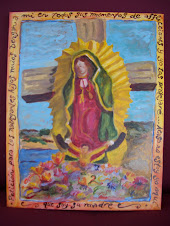
I've been spending today with Sor Juana Ines de la Cruz. I can't believe I carried away a degree in Spanish and Latin American Area Studies and never got to know her better. The textbooks I studied described her briefly as a nun who wrote a lot. That says something about the state of university curricula prior to the emergence of women's studies.
Juana Ines de Asbaje y Ramirez was born in New Spain (now Mexico) around 1651. She learned to read when she was three years old and wrote her first play at the age of eight. She mastered Latin in twenty lessons before becoming a teenager. When she was fourteen, she became a maid of honor to the wife of the Spanish Viceroy in Mexico City, and delighted the court with her erudition and learning. But at twenty-one she entered a convent because in order to continue her life of writing, musical composition, scientific and mathematical studies and vast correspondence with the other literary lights of the day, that was the only option available to her. That's when she became Sor Juana Ines de la Cruz.
For the next twenty years she wrote prodigiously on theology, mathematics, and philosophy, which brought down the anger of the church hierarchy for dealing with subjects outside of the purview of women. But she also wrote about love, rapturous, passionate works of poetry and prose. Her most famous work was a response to the bishop at Puebla who was supposed to be her friend. He had written in subterfuge, disguising himself as one of her sisters in the convent, and advising her to leave off her studies, not to meddle in the affairs of men, and to devote herself to the religious life. Her Respuesta is a classic text in defense of woman's intelligence and the right to education.
She died in 1695 during a cholera epidemic. Shortly before her death, she had sold her library of over 4,000 volumes and given the proceeds to charity. What remains of her writings is contained in three large volumes, though it is agreed that the majority of her prose work, aside from her Respuesta, was lost or destroyed. Her image is perhaps in greater circulation than that of Guadalupe, as it is imprinted on the 200 peso note. Before the last devaluation, she was on the 1,000 peso note. Sor Juana is definitely a trail blazer in Virgin Territory.





fascinating!!! sounds like you should write a biography!
ReplyDeleteSo many parallels between Sor Juana and Mary Baker Eddy, as there always are among women who long to devote themselves to intellectual growth. So grateful that Larry is in the kitchen making his own breakfast right now. He does his best so I don't have to enter a convent. :-)
ReplyDelete